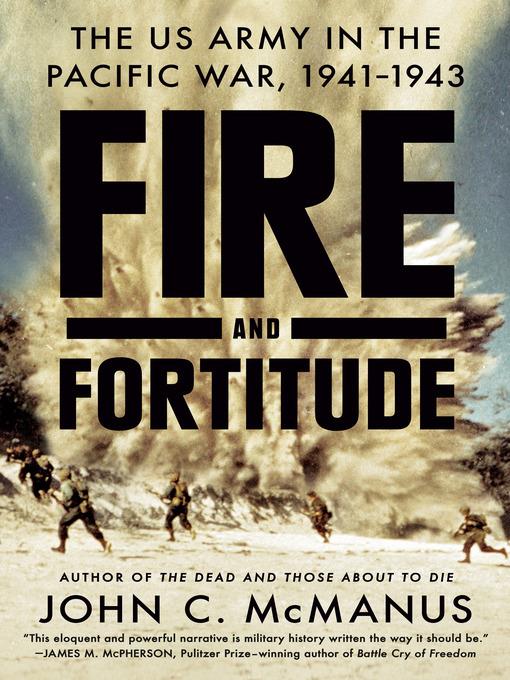
Fire and Fortitude
The US Army in the Pacific War, 1941-1943
کتاب های مرتبط
- اطلاعات
- نقد و بررسی
- دیدگاه کاربران
نقد و بررسی

June 1, 2019
An expert, opinionated World War II history with some unsettling conclusions. McManus (U.S. Military History/Missouri Univ. of Science and Technology; Hell Before Their Very Eyes: American Soldiers Liberate Concentration Camps in Germany, April 1945, 2015, etc.) points out that Marines received almost all the glory during the war, a fact still resented by the Army, which did "the vast majority of the planning, the supplying, the transporting, the engineering, the fighting, and the dying to win [the] war." Unlike most histories that move quickly from Pearl Harbor to the gratifying mid-1942 victories in the Coral Sea, Midway, and Guadalcanal, half of this book covers the painful earlier months. Japan invaded the Philippines two weeks after Pearl Harbor. The commander in the Philippines, Douglas MacArthur, considered himself a warrior. Warriors attack, so he discarded the long-planned retreat to the Bataan peninsula and announced that he would defeat the Japanese at the beaches, an impossible task. By the time MacArthur, seeing his forces in full retreat, reinstated the Bataan plan, it was too late. The troops made it, but most supplies remained behind. Despite outnumbering the enemy, starvation, disease, and shortages doomed them. Evacuated to Australia, MacArthur directed the reconquest of New Guinea, where, despite a better outcome, troops suffered the same miseries as they had on Bataan. McManus moves on with gripping accounts of campaigns in China, Burma, the Solomons, and the Gilberts. Readers may learn more than they want to know about Japan's vicious treatment of POWs and flinch at the author's low opinion of Gen. MacArthur. Military historians rarely share the worshipful view of civilian colleagues, who give him a pass on the Philippine debacle, brush off the fact that his troops disliked him, and happily pronounce him a military genius with an inflated ego. McManus' MacArthur comes off as an arrogant self-promoter with modest military skills and no rapport with fighting men, routinely sacrificing their lives (and the careers of subordinate commanders) to burnish his image. A moderately revisionist, entirely engrossing WWII history.
COPYRIGHT(2019) Kirkus Reviews, ALL RIGHTS RESERVED.

June 10, 2019
With this excellent entry, military historian McManus (Deadly Sky) begins a two-volume chronicling of the history of the U.S. Army’s activities in the Pacific theater during WWII. The first section focuses on Pearl Harbor and the disastrous American defeat in the Philippines, with a particular emphasis on the plight of American POWs enduring unsanitary conditions and abuse at the hands of their Japanese captors. The second part looks at the key battles of the American counterattack in the Pacific, including Buna, Guadalcanal, and Makin. Extensive research drawing on government archives and academic and private collections has yielded diverse and extensive sources, allowing the author to seamlessly shift the reader’s point of view from high command to the frontline view of soldiers in battle. McManus doesn’t shy away from noting the flaws of the major players, such as Gen. Douglas MacArthur, who deviated from the long-accepted war plan for the defense of the Philippines and kept his family with him throughout the war in contradiction to army policy. For all its length and its detailed scholarly research, this history is imminently readable. Both the general reader and the military history expert will find it informative and enjoyable. Agent: Michael Congdon, Don Congdon Assoc.

July 1, 2019
McManus (history, Missouri Univ. of Science and Technology; The Dead and Those About To Die) writes the first of two projected volumes on the role of the U.S. Army in the Pacific, a theater of World War II dominated by the Navy and Marine Corps in most histories. Many readers will be familiar with certain events, such as the fall of the Philippines and the Bataan Death March, but McManus also provides full treatments of lesser-known campaigns, including the fighting in the Aleutians and Papua New Guinea. The battles in these campaigns were just as bitter as those faced by the marines at Guadalcanal with Japanese soldiers committing suicide rather than face capture. Yet, these campaigns were not decisive in the outcome of the war and have subsequently been ignored. However, the lessons learned from them helped pave the way for ultimate Allied victory over Japan. VERDICT Clearly written in an engaging style, this book will appeal to general readers of military history.--Michael Farrell, Reformed Theological Seminary, Orlando, FL
Copyright 2019 Library Journal, LLC Used with permission.

























دیدگاه کاربران